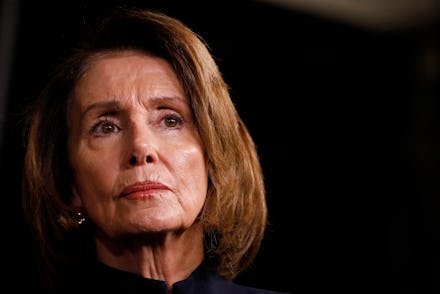Nancy Pelosi hasn't ruled out impeaching Trump again

On Friday, Supreme Court Justice Ruth Bader Ginsburg died at her home in Washington, D.C. Her death left many reeling as they considered the long-term political implications if President Donald Trump is permitted to select her replacement — something he will absolutely attempt to do. Just a day after Ginsburg's death, Trump said he would pick his nominee in the upcoming week, a plan that has been largely backed by Senate Republicans. During a Monday interview, Trump gave an updated timeline, saying, "I think it'll be on Friday or Saturday, and we want to pay respect."
Meanwhile, Democrats are mobilizing to ensure the current president won't succeed in replacing Ginsburg — and their approach could include a second impeachment.
During an appearance on ABC's "This Week with George Stephanopoulos," House Speaker Nancy Pelosi was asked what would happen if the Senate tried to push a nominee through during a lame-duck session (the period when Congress is in session after a new president is elected but before their term begins).
After Stephanopoulos floated the possibility of impeachment, Pelosi replied, "We have our options. We have our arrows in the quiver that I'm not about to discuss right now, but the fact is we have a big challenge in our country. This president has threatened to not even accept the results of the election."
When Stephanopoulos pressed Pelosi to confirm that Democrats are "not ruling anything out," she responded that "We have a responsibility. We take an oath to protect and defend the Constitution of the United States. We have a responsibility to meet the needs of the American people."
For their part, the American people are seemingly in favor of waiting to replace Justice Ginsburg. A Reuters-Ipsos poll released on Sunday found that sixty-two percent of Americans said the winner of the upcoming election should determine who fills Ginsburg's seat. In sharp contrast to the partisan divide seen among politicians, it's an opinion shared by eight out of ten Democrats and five out of ten Republicans.
To be clear, there's no rule that prevents the Senate from filling the vacant seat as soon as Trump makes a nomination. However, many have pointed out that in 2016, Senate Majority Leader Mitch McConnell (R-KY) blocked President Obama's pick following Justice Antonin Scalia's passing eight months before the election.
In a Friday statement, McConnell made it clear that he doesn't intend to hold the same standards this time around. “Americans reelected our majority in 2016 and expanded it in 2018 because we pledged to work with President Trump and support his agenda, particularly his outstanding appointments to the federal judiciary," he said. "Once again, we will keep our promise. President Trump’s nominee will receive a vote on the floor of the United States Senate.”
So far, only two Republicans Senators, Lisa Murkowski (AK) and Susan Collins (ME), have spoken out against voting on a nominee before the election. "For weeks, I have stated that I would not support taking up a potential Supreme Court vacancy this close to the election," Murkowski said in a statement. "Sadly, what was then a hypothetical is now our reality, but my position has not changed. I did not support taking up a nomination eight months before the 2016 election to fill the vacancy created by the passing of Justice Scalia. We are now even closer to the 2020 election - less than two months out - and I believe the same standard must apply," she added.
As for Ginsburg, days before her death, the justice dictated a statement to her granddaughter, Clara Spera, saying, "My most fervent wish is that I will not be replaced until a new president is installed."